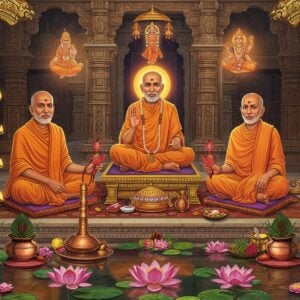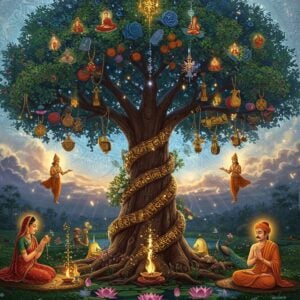
Karma, a concept deeply rooted in ancient Indian philosophy, shapes the lives of millions. Derived from the Sanskrit word meaning “action” or “deed,” karma is the principle of cause and effect, where intentions and actions influence one’s future.
The Core Principles of Karma
Karma operates on the fundamental principle of cause and effect. Good intentions and actions contribute to positive karma and favorable outcomes, while negative intentions and actions lead to negative karma and adverse consequences. It emphasizes the interconnectedness of actions and their repercussions, often summarized as “what goes around comes around.”
Intent plays a crucial role in karma. A positive action coupled with a positive intention generates good karma, whereas a negative action with ill intent produces bad karma. Unintentional or disinterested actions might not carry the same karmic weight as deliberate ones. Explore our range of Tulsi Malas and Incense Sticks to enhance your spiritual practices.
Karma and Rebirth
Many Indian religions, including Hinduism, Buddhism, Jainism, and Sikhism, link karma to the cycle of rebirth (samsara). Karma is believed to influence the quality of future lives. The continuous cycle of birth, death, and rebirth is governed by the accumulation and consequences of karma. However, it’s important to note that not all scriptures associate karma with rebirth. Deepen your understanding of these concepts with our insightful blog post: Karma, Reincarnation, Dharma: An Interconnected Journey.
How Karma Influences Your Life
Karma encourages mindful living by highlighting the importance of intentions and actions. Your choices shape your life’s trajectory. By cultivating awareness of your thoughts, words, and deeds, you can make more conscious decisions and strive for positive outcomes. Enhance your understanding of the science behind puja with our blog post: Understanding the Science Behind Puja for Holistic Well-being. At Poojn.in, we offer a wide variety of ritual items to support your spiritual journey.
Types of Karma
- Sanchita Karma: This refers to the accumulated karma from past actions across multiple lifetimes, representing the storehouse of karmic consequences.
- Prarabdha Karma: This is the portion of accumulated karma that is currently manifesting and shaping the circumstances of your present life.
- Agami Karma: This encompasses the future karma generated by your present actions, some of which might manifest in the current life itself.
- Kriyamana Karma: This type of karma represents the immediate consequences of your current actions, yielding results in the present or future.
Addressing Misconceptions about Karma
Karma is often mistaken for fate, destiny, or predetermination, but it is distinct from these concepts. The Sanskrit term for fate is Prarabdha. Karma isn’t a system of punishment but rather a law of consequences. It is a continuous cycle of action, consequence, and reaction. Explore the power of the Gayatri Mantra for spiritual growth: Unlock the Power of the Gayatri Mantra for Spiritual Growth.
Karma in Different Religions
Hinduism views karma as the relationship between a person’s actions (mental and physical) and their consequences. It emphasizes the impact of actions in current and past lives. Different schools of thought within Hinduism offer varying interpretations, some emphasizing determinism while others allowing for free will.
In Buddhism, karma specifically refers to actions driven by intention, leading to future consequences. It emphasizes that individuals experience the consequences of their actions without intervention from a higher power. Learn more about aligning your puja with celestial energies: Aligning Your Puja with Celestial Energies for Maximum Benefit.
The 12 Laws of Karma
The 12 Laws of Karma provide a framework for understanding its principles. These include the Great Law (cause and effect), the Law of Creation (participation in life), the Law of Humility (acceptance for growth), the Law of Growth (changing oneself), the Law of Responsibility (owning your actions), the Law of Connection (interconnectedness of past, present, and future), the Law of Focus (concentrated attention), the Law of Giving and Hospitality (generosity and kindness), the Law of Here and Now (present moment awareness), the Law of Change (learning from past patterns), the Law of Patience and Reward (persistence for valuable outcomes), and the Law of Significance and Inspiration (valuing contributions). Discover a guide to Navagraha Puja: Seeking Harmony and Prosperity: A Guide to Navagraha Puja.
Poojn.in: Supporting Your Spiritual Journey
Poojn.in, India’s leading online store for cultural goods and services, offers a wide range of authentic puja items and ritual materials. From complete puja kits and high-quality incense to organic ritual materials and traditional worship accessories, we provide everything you need for your spiritual practices. Our products are carefully sourced and verified for authenticity and religious compliance. Explore our diverse collection to enhance your spiritual journey. Find high-quality Sindoor and Alta at Poojn.in. Discover the significance of the Danteshwari Temple: Danteshwari Temple: A Complete Guide.
Embrace karma as a guiding principle for intentional living and creating a positive future for yourself and your community. Learn more about exploring local culture during a pilgrimage to the Danteshwari Temple: Danteshwari Temple Pilgrimage: Exploring Local Culture. Explore the spiritual significance and architectural marvel of the Danteshwari Temple: Danteshwari Temple: A Spiritual Oasis and Architectural Wonder.


